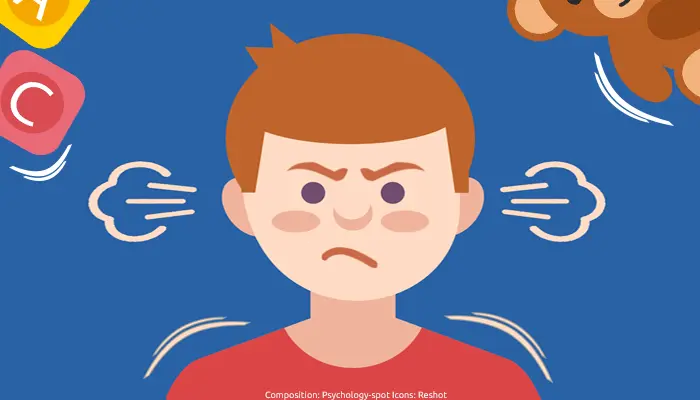
Childhood irritability is one of the main reasons parents consult when they go with their children to a psychologist. It is no wonder since dealing with outbursts of anger and frustration is not easy, so parents feel that they do not have the appropriate tools to deal with this permanent irritation and bad mood.
Other parents attribute irritability in children to their age, so they do not pay much attention to it because they think that it is a phase that will pass. And while it is true that all children – and adults – can be irritable at some point, especially when they are tired or not feeling well, the truth is that childhood irritability can be a symptom of more serious problems, so which is not something that should be neglected.
Mental problems associated with irritability in children
Irritability is nothing more than a low threshold for experiencing anger in response to negative events. In practice, the child has a low frustration tolerance, so that at the slightest setback, obstacle or refusal to comply with his wishes, he reacts with anger.
Childhood irritability usually manifests itself as age-inappropriate outbursts of temper and a mood marked by bad mood most of the time. It is as if the child will not find peace. In some cases it is also accompanied by aggression, which acts as a physical escape valve to release internal tension.
This state of persistent irritability (which affects approximately 3% of children) has been associated with several mental health problems in children and adolescents. In fact, it is one of the specific symptoms of oppositional defiant disorder, ADHD, bipolar disorder, and autism. And it increases the risk of developing anxiety or depression later in life.
A study carried out at Cardiff University made a distinction between irritability that begins in childhood and that which develops in adolescence. After analyzing almost 8,000 children and adolescents over a period of eight years, it was found that childhood irritability is more common in children and is associated with ADHD. In contrast, irritability that begins in adolescence is more common in girls and is linked to depression.
Another investigation carried out by the National Institutes of Health of the United States concluded that childhood irritability “Is more of a mood problem than a purely behavioral manifestation” and that it should not be ignored since “It can cause substantial deterioration of mental health”.
It also noted that these children have a bias toward threatening stimuli, which means they see the world in a more hostile way, and have difficulty processing rewards. Additionally, they are less flexible in interpreting and responding to social cues.
In practice, it is as if their threat hunting system is constantly active, which generates or increases irritability. To which is added that they have difficulties generating more adaptive responses to frustration; That is, it is difficult for them to modify their strategy or redirect their efforts towards an alternative objective.
In 2013, the Diagnostic and Statistical Manual of Mental Disorders (DSM 5) even added the Disruptive Mood Dysregulation Disorder to differentiate cases of children who present chronic and severe irritability accompanied by systematic tantrums.
When does childhood irritability start to be worrying?
We can all react irritably at times. Children are no exception. However, childhood irritability can become a sign of something more serious when:
1. It becomes a habitual response pattern, so that the child reacts to insignificant events with irritation, anger and annoyance. Therefore, their irritability is not specific or limited to certain situations, but is generalized.
2. It increases or decreases as the child grows. As a general rule, as children mature, tantrums, irritability and aggression decrease as their social and emotional skills increase, along with self-control. If irritability and aggressiveness increase after the age of 4, they are an indicator of an underlying psychological problem that must be addressed.
3. Appearance of other symptoms, such as outbursts of temper, increasingly defiant negativity, a tendency toward confrontation, problems following rules, and signs of aggression.
4. It occurs in different contexts, so that the child responds irritably both at home and at school, with adults and with his or her peers, which is a sign that irritability has become an automatic reaction in different situations.
5. It affects other areas, so irritability ends up causing problems in their relationships with other children, undermines their academic performance or affects their well-being.
What can parents do to control childhood irritability?
A study conducted at the University of Wisconsin-Madison found that children who suffer physical abuse pay close attention to expressions of anger, which could contribute to the maladaptive neurological mechanism underlying irritability. That means that, to address irritability in children, you must start by creating a serene environment at home.
Although we are not always aware of it, we can transmit our tension and irritability to children, who have fewer psychological tools to deal with these emotions. For this reason, it is not strange that the treatment of childhood irritability begins with parental training.
Tantrums, confrontation, arguments, and talkbacks may be difficult to manage, but during these episodes it is vital to remain calm and patient. Obviously, you may feel angry or frustrated, just like your child, but the important thing is how you manage those emotions because your reaction will become an example to follow. How can you expect a child to control his frustration if you are not able to control yours?
When faced with childhood irritability, respond in a firm but calm manner. You can follow these steps since having a clear mental script will prevent you from losing your nerve:
• Clearly review the rules. You can remind him/her, “I know you’re upset, but you can’t yell or curse,” or “I understand you’re frustrated, but you can’t throw or break things.”
• Help him/her calm down. When children are irritable, it is difficult for them to control their behavior. You can ask him/her: “Take a deep breath and calm down.” Other strategies to help him/her calm down are to ask to count to 10 or use a time-out, so that he/she takes a few minutes away from the conflict by leaving the room.
• Ask him/her to explain how he/she feels. It is also recommended that you help him/her express what he/she feels since emotional granularity is what will allow him/her to avoid outbursts of anger.
• Look for solutions for the future. It is not enough to express what he/she feels, your child must also have an action plan to deal with frustration in the future, so it is advisable that you reflect on the alternative behaviors that he can put into practice when he/she begins to feel irritable. You can teach him/her self-control techniques for children or even take it into children’s meditation.
Finally, it is also important to seek psychological guidance to understand what is at the base of this irritability. There are psychopharmacological approaches, but psychotherapeutic treatments are usually more effective in the long term, unless the irritability is linked to an obvious psychiatric disorder.
References:
Riglin, L. et. Al. (2019) Identifying Novel Types of Irritability Using a Developmental Genetic Approach. Am J Psychiatry; 176(8): 635-642.
Stringaris, A. e. Al. (2018) Practitioner Review: Definition, recognition, and treatment challenges of irritability in young people. J Child Psychol Psychiatry; 59(7): 721-739.
Leibenluft, E. & Stoddard, J. (2013) The developmental psychopathology of irritability. Dev Psychopathol; 25(402): 1473–1487.
Pollak, S. D. (1997) Cognitive Brain Event-Related Potentials and Emotion Processing in Maltreated Children. Child Dev; 68(5): 773-787.



